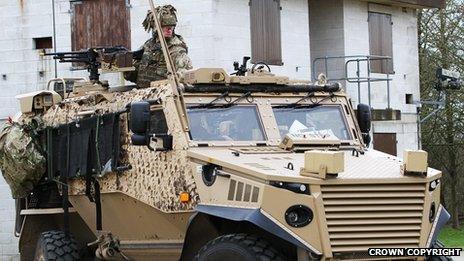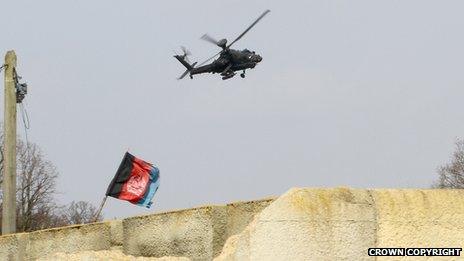Afghanistan: Over for some Britons, beginning for others
- Published
34 Squadron the RAF Regiment in training in Norfolk before heading to Afghanistan
Thirteen years of fighting in Afghanistan are due to end for UK combat troops later this year. But while many will be dreaming of home, the men and women of 34 Squadron RAF Regiment are just arriving to oversee the withdrawal.
The call to prayer rings out across a compound surrounded by sand-coloured walls.
Men clean Kalashnikovs with rags on a large wooden table.
A pot boils in a corner, where an Afghan man stands dressed in a familiar blue police uniform.
As traditional music rings out and sellers stand chatting outside shops, it's difficult to remember this is not Afghanistan but south-east England.
Stanford Military Training Area is home to a series of towns and villages replicating those in Helmand province. This is the culmination of six months of training, a final exercise to assess the unit's capabilities.
Far from finished
"Well obviously it's a little bit warmer out there, but it's good a good set-up for training really," says L/Cpl Matthew Perry, comparing the training to a previous tour in Afghanistan. This isn't his first trip, but it will be the last of many.
One of the RAF Regiment's roles is to protect aircraft leaving Camp Bastion as British forces bring their role to a close in Afghanistan.
Bastion was placed in the centre of one of the most violent parts of Afghanistan, Helmand province. When paired with the US Marine Camp Leatherneck, the base sprawled to the size of Reading. At its height home to almost 30,000 Nato troops, it became one of the biggest bases in Afghanistan.
Camp Bastion's flight movements equal that of Stansted Airport in south-east England, and every one must be looked after from the ground.

Despite the obvious risks of being involved in the final stages of a conflict over a decade old and far from finished, Flying Officer Tom Bolland isn't worried.
"I'm really looking forward to getting into a testing environment where you don't know what's going to happen," he says.
He's the commander of C flight, 34 Squadron RAF Regiment, a group of about 30 gunners - most of which have never been to Afghanistan before
"It's my first time out there and for a lot of the guy's it's their first time as well, I've got about five lads who've been before so I can use their experience to bring the younger ones on," he says.
It will be Senior Aircraftsman Mark Goodall's first tour. And standing outside a tent in southern England, there's a strong feeling of apprehension - but he feels this training is helping to prepare him. Afghan volunteers are used to make the scenarios more realistic and add to the feeling of being in Afghanistan.
"From what I can see they've brought hundreds of Afghans in. They don't talk a word of English, so you have to use the interpreters. They're cooking food how they would cook food, they're living in places like they'd live and they've actually got a working well and everything, so for me it's quite realistic.
Finger along his throat
"We've just been with the commander of the police and we moved into this village to find out what atmospherics are like on ground."
He's referring to how the place feels. It becomes a sixth sense, and many troops will know an attack is coming. This time the gunners are well aware a simulation attack is imminent, and the feeling outside the tent is tense.
This ability to know when something is going to happen is a skill that previously would be learnt through experience. At the beginning of British involvement in Helmand this could come at the cost of lives. But now as the men and women role play with the tens of Afghan volunteers, it can be learnt in the safety of Britain.
But among the Afghan volunteers themselves there's another feeling, one of fear. They're scared, scared of the camera, scared of being recognised by the Taliban and scared of the consequences if they are.
One who will remain anonymous for this very reason slides his finger along his throat. "You know what the Taliban will do to my family if they see me?" he says.
The training isn't easy, the help from the volunteers is vital.
In Afghanistan, the unit will be heading miles outside the main camp in order to stop the area surrounding it from falling into Taliban hands.
In 2012 the fighting was much closer to home for the RAF Regiment.

On a moonless night, heavily armed militants gained access through a fence, past an unmanned guard tower.
Dressed in American military uniforms, they destroyed six US Marine harrier jets, damaging a further two.
The RAF Regiment's quick-reaction force, together with US Marines and helicopter gunships killed 14 militants, leaving one wounded and arrested.
Two US Marines were killed and a number were injured in the fire-fight that lasted more than four-and-a-half hours. This was the worst attack in Bastion's history.
It called into question the security of the camp and highlighted flaws in the previously safe airfield.
The Ministry of Defence insists the flaws have been rectified - but as the soldiers work in Helmand draws to a close, the RAF Regiment's job will continue to the very end.